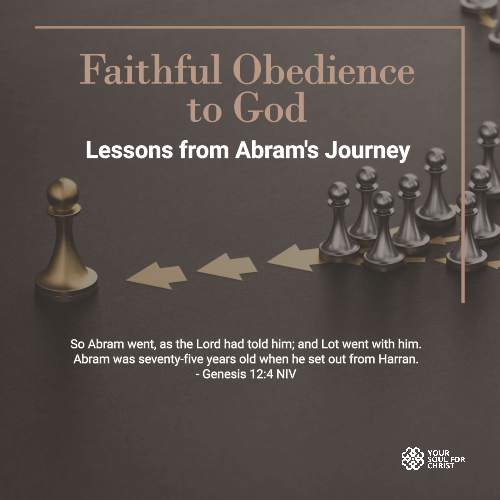So Abram went, as the Lord had told him; and Lot went with him. Abram was seventy-five years old when he set out from Harran.
Genesis 12:4 NIV
Isn’t it remarkable that we have the privilege of free will to choose whether or not to practice faithful obedience to God? Despite being the Almighty Creator, He does not force us to follow Him. Instead, God lovingly extends His invitation and leaves the choice to us. The Creator of the universe, who holds all power, allows us to make our own decisions.
In Genesis 12, we see this in action when God calls Abram to follow Him. Abram had the freedom to decline, but he chose to respond with faithful obedience to God. God didn’t coerce him; instead, He made His intentions clear and left the choice to Abram.
Similarly, we face moments when God invites us to trust and obey Him. He does not force us to follow Him, no matter how beneficial His path may be for our lives. At every juncture, we are faced with choices. These moments call for intentional decisions, as our responses to God’s call can shape our destinies. Practising faithful obedience to God is a privilege and a responsibility. It requires not just a willingness to follow but a commitment to align our actions and attitudes with His will.
In Genesis 12:4, we see Abram’s response: “So Abram went, as the Lord had told him.” This seemingly simple phrase is profound. It highlights not only Abram’s obedience but also his attitude toward God’s instruction.
Many people believe that mere obedience is enough, but to God, the manner of our obedience is just as important as the action itself. Abram’s obedience was marked by promptness and faithfulness. He didn’t seek shortcuts or alternative ways to fulfil God’s call. He didn’t justify disobedience by thinking, “There are many ways to reach the same goal.” For Abram, there was only one path—the one God had laid out for him. His faithful obedience to God was evident in the precision and attitude of his actions.
This teaches us a critical lesson: God doesn’t just desire obedience; He desires exact obedience. When we try to figure things out on our own instead of following God’s instructions, we often face unnecessary setbacks. It’s like buying a product that requires assembly and attempting to put it together without reading the manual. You might succeed temporarily, but you risk damaging something or wasting valuable time.
Likewise, partial obedience to God’s instructions can lead to significant losses—material, emotional, or spiritual. Abram could have suffered greatly if he had deviated from God’s plan. Meanwhile, incomplete obedience would not have been pleasing to God.
In conclusion, Abram’s story reminds us that following God requires more than just willingness—it demands trust and faithful obedience. When we choose to obey, we must do so with the right attitude and in the exact way God instructs. Half-hearted or incomplete obedience is not enough.
Let us take inspiration from Abram in Genesis 12 and commit to following God’s plan fully and faithfully. In doing so, we align ourselves with His purpose, avoid unnecessary delays or losses, and experience the fullness of His blessings.
“So Abram went, as the Lord had told him.” May this be the testimony of our lives as we choose God’s way over our own.
